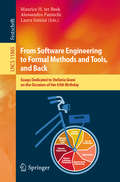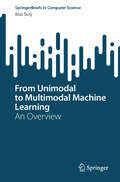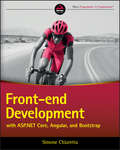- Table View
- List View
From Social Science to Data Science: Key Data Collection and Analysis Skills in Python
by Bernie HoganFrom Social Science to Data Science is a fundamental guide to scaling up and advancing your programming skills in Python. From beginning to end, this book will enable you to understand merging, accessing, cleaning and interpreting data whilst gaining a deeper understanding of computational techniques and seeing the bigger picture. With key features such as tables, figures, step-by-step instruction and explanations giving a wider context, Hogan presents a clear and concise analysis of key data collection and skills in Python.
From Software Engineering to Formal Methods and Tools, and Back: Essays Dedicated to Stefania Gnesi on the Occasion of Her 65th Birthday (Lecture Notes in Computer Science #11865)
by Alessandro Fantechi Maurice H. ter Beek Laura SeminiThis volume was published in honor of Stefania Gnesi’s 65th birthday. The Festschrift volume contains 32 papers written by close collaborators and friends of Stefania and was presented to her on October 8, 2019 one-day colloquium held in Porto, Portugal, The Festschrift consists of eight sections, seven of which reflect the main research areas to which Stefania has contributed. Following a survey of Stefania's legacy in research and a homage by her thesis supervisor, these seven sections are ordered according to Stefania's life cycle in research, from software engineering to formal methods and tools, and back: Software Engineering; Formal Methods and Tools; Requirements Engineering; Natural Language Processing; Software Product Lines; Formal Verification; and Applications.
From Street-smart to Web-wise®: A Cyber Safety Training Program Built for Teachers and Designed for Children (Book 1)
by Brian Moore Al Marcella Madeline ParisiIn a world where tiny fingers are as familiar with touchscreens as they are with crayons, ensuring our children’s safety online has never been more crucial. From Street‑smart to Web‑wise®: A Cyber Safety Training Program Built for Teachers and Designed for Children isn’t just another book – it’s a passionate call to action for teachers and a roadmap to navigate the digital landscape safely, with confidence and care.Written by authors who are recognized experts in their respective fields, this accessible manual is a timely resource for educators. Dive into engaging content that illuminates the importance of cyber safety, not only in our classrooms but extending into the global community.Each chapter is filled with practical examples, stimulating discussion points, and ready‑to‑use lesson plans tailored for students in kindergarten through second grade. Regardless of your technology skill level, this book will provide you with the guidance and the tools you need to make student cyber‑safety awareness practical, fun, and impactful.As parents partner with educators to create cyber‑secure spaces, this book stands as a framework of commitment to that partnership. It’s a testament to taking proactive steps in equipping our young learners with the awareness and skills they need to tread the digital world securely.By choosing From Street‑smart to Web‑wise®: A Cyber Safety Training Program Built for Teachers and Designed for Children, you position yourself at the forefront of educational guardianship, championing a future where our children can explore, learn, and grow online without fear. Join us on this journey to empower the next generation—one click at a time!
From Street-smart to Web-wise®: A Cyber Safety Training Program Built for Teachers and Designed for Children (Book 2)
by Brian Moore Al Marcella Madeline ParisiBook 2 continues as the tiny fingers in Book 1 Grades K-2 grow and become more familiar with online activities. The critical job of ensuring our children’s safety expands as students become more independent and begin to have greater online autonomy. From Street‑smart to Web‑wise®: A Cyber Safety Training Manual Built for Teachers and Designed for Children isn’t just another book — it’s a passionate call to action for teachers, a roadmap to navigate the digital landscape safely, with confidence and care.Written by authors who are recognized experts in their respective fields, this accessible manual is a timely resource for educators. Dive into engaging content that illuminates the importance of cyber safety, not only in our classrooms but extending into the global community.Each chapter is filled with practical examples, stimulating discussion points, and ready‑to‑use lesson plans tailored for students in third and fourth grades. Regardless of your technology skill level, this book will provide you with the guidance and the tools you need to make student cyber‑safety awareness practical, fun, and impactful.As parents partner with educators to create cyber‑secure spaces, this book stands as a framework of commitment to that partnership. It’s a testament to taking proactive steps in equipping our young learners with the awareness and skills they need to tread the digital world securely.By choosing From Street‑smart to Web‑wise®: A Cyber Safety Training Manual Built for Teachers and Designed for Children, you position yourself at the forefront of educational guardianship, championing a future where our children can explore, learn, and grow online without fear. Join us on this journey to empower the next generation — one click at a time!
From Street-smart to Web-wise®: A Cyber Safety Training Program Built for Teachers and Designed for Children (Book 3)
by Al Marcella Brian Moore Madeline ParisiIn Book 3, fifth and sixth graders are maturing, becoming more independent, and online activities are second nature. From Street‑smart to Web‑wise®: A Cyber Safety Training Manual Built for Teachers and Designed for Children isn’t just another book — it’s a passionate call to action for teachers. It is a roadmap to navigate the digital landscape safely, with confidence and care, as the critical job of ensuring students’ safety as the digital world expands.Written by authors who are recognized experts in their respective fields, this accessible manual is a timely resource for educators. This book helps us dive into engaging content that illuminates the importance of cyber safety, not only in our classrooms but also in the global community.Each chapter is filled with practical examples, stimulating discussion points, and ready‑to‑use lesson plans tailored for students in fifth and sixth grades. Regardless of your technology skill level, this book will provide you with the guidance and the tools you need to make student cyber‑safety awareness practical, fun, and impactful.As parents partner with educators to create cyber‑secure spaces, this book stands as a framework of commitment to that partnership. It’s a testament to taking proactive steps in equipping our young learners with the awareness and skills they need to tread the digital world securely.By choosing From Street‑smart to Web‑wise®: A Cyber Safety Training Manual Built for Teachers and Designed for Children, you position yourself at the forefront of educational guardianship, championing a future where our children can explore, learn, and grow online without fear. Join us on this journey to empower the next generation — one click at a time!
From Street-smart to Web-wise®: A Cyber Safety Training Program Built for Teachers and Designed for Children (Book 4)
by Al Marcella Madeline Parisi Brian MooreOur seventh and eighth graders are now "officially" teens, and online activities are second nature. From Street‑smart to Web‑wise®: A Cyber Safety Training Manual Built for Teachers and Designed for Children isn’t just another book. Teachers will find this book to be a road map to navigate the digital landscape safely, with confidence and care, as their critical job of ensuring students’ safety in a digital world expands.Dive into engaging content that illuminates the importance of cyber safety, not only in our classrooms but extending into the global community.Written by authors who are recognized experts in their respective fields, this accessible manual is a timely resource for educators. Each chapter is filled with practical examples and teacher tips, stimulating discussion points, and ready‑to‑use lesson plans tailored for students in seventh and eighth grades. Regardless of your technology skill level, this book will provide you with the guidance and the tools you need to make student cyber safety awareness practical, fun, and impactful.Parents consider educators their partners in creating cyber‑secure spaces. This book stands as a framework of commitment to that partnership whether you are in a middle school environment or in a child‑serving agency. It confirms proactive steps in equipping our young learners with the awareness and skills they need to tread the digital world securely.By choosing From Street‑smart to Web‑wise®: A Cyber Safety Training Manual Built for Teachers and Designed for Children, you position yourself at the forefront of educational guardianship, championing a future where our children can explore, learn, and grow online without fear. Join us on this journey to empower the next generation—one click at a time!
From Techie to Boss: Transitioning to Leadership
by David Jacobs Scott CromarFrom Techie to Boss teaches technical people who are making or mulling the transition from team player to team leader all the management techniques and soft leadership skills they never needed before-but need now, pronto. Veteran team lead and project manager Scott Cromar lays out the classical management training course, but stripped down to precisely the essentials that techies need to start managing on the fly. He gets it that a front-line techie getting a field promotion to team leader just doesn't have the time to wade through an MBA textbook bulging with irrelevant material. The author appreciates how you got to the place where you need this book. Management tapped you instead of some experienced manager from the outside because you know the technical challenges, company culture, and team players better than anyone else: you're ready to hit the ground running. But the skills that make you an excellent techie are not sufficient to make you a successful manager. The rules of your world have abruptly changed. You will now be judged not by your puzzle-solving elegance but by how effectively your team contributes to the organization's bottom line. From Techie to Boss shows you how to translate and adapt the analytic skills that made you an outstanding techie to your new responsibilities as a technical manager. Even more crucially, this book teaches you a whole new set of interpersonal, organizational, and metrical skills you never needed before, but without which you cannot succeed as a manager.
From Terrorism to Television: Dynamics of Media, State, and Society in Pakistan
by Qaisar AbbasThis book unpacks the media dynamics within the socio-cultural, political, and economic context of Pakistan. It provides an in-depth, critical, and scholarly discussion of contemporary issues such as media, state, and democracy in Pakistan; freedom of expression in Pakistani journalism; Balochistan as a blind spot in mainstream newspapers; media control by state institutions; women and media discourses; TV talk shows and coverage of Kashmir; feminist narrative and media images of Malala Yousufzai and Mukhtaran Mai; jihad on screen; and Osama bin Laden’s death on screen, to understand the relation between media and terrorism. The book covers diverse media types including TV, radio, newspapers, print media, films, documentary, stage performance, and social media. Detailed, interdisciplinary, analytical, and with original perspectives from journalists as well as academics, this volume will be useful to scholars and researchers of media studies, Pakistan studies, politics and international affairs, military and terrorism studies, journalism and communication studies, and South Asian studies. It will also interest general readers, policy makers, and those interested in global journalism, mass media, and freedom of expression.
From Text to Understanding: Using Fuzzy Sets to Analyse Free-Form Text Data (Fuzzy Management Methods)
by Miroslav Hudec Miloš Švaňa František ZapletalSocial media and other sources of text data are still underutilized resources in public decision-making. Most public organizations and governmental bodies rely mainly only surveys, interviews and other traditional methods for gathering opinions. One issues is a lack of easy-to-use tools for mass text data processing that would enable these organizations to process and understand this type of data. This book introduces a novel text data analysis framework designed for public decision making, specifically on the level of municipalities. The framework combines sentiment analysis with topic modelling and a fuzzy-based approach for capturing the diversity in sentiment arising from the fact that different people have different opinions on a given topic. The book is recommended for practitioners in public decision making as well as researchers analyzing large amounts of text data in order to understand people&’s opinions.
From Texting to Teaching: Grammar Instruction in a Digital Age
by Troy Hicks Jeremy HylerDon’t blame technology for poor student grammar; instead, use technology intentionally to reach students and actually improve their writing! In this practical book, bestselling authors Jeremy Hyler and Troy Hicks reveal how digital tools and social media – a natural part of students’ lives – can make grammar instruction more authentic, relevant, and effective in today’s world. Topics Covered: Teaching students to code switch and differentiate between formal and informal sentence styles Using flipped lessons to teach the parts of speech and help students build their own grammar guides Enlivening vocabulary instruction with student-produced video Helping students master capitalization and punctuation in different digital contexts Each chapter contains examples, screenshots, and instructions to help you implement the ideas. With the strategies in this book, you can empower students to become better writers with the tools they already love and use daily. Additional resources and links are available on the book’s companion wiki site: textingtoteaching.wikispaces.com
From Traditional Fault Tolerance to Blockchain
by Wenbing ZhaoThis book covers the most essential techniques for designing and building dependable distributed systems, from traditional fault tolerance to the blockchain technology. Topics include checkpointing and logging, recovery-orientated computing, replication, distributed consensus, Byzantine fault tolerance, as well as blockchain. This book intentionally includes traditional fault tolerance techniques so that readers can appreciate better the huge benefits brought by the blockchain technology and why it has been touted as a disruptive technology, some even regard it at the same level of the Internet. This book also expresses a grave concern on using traditional consensus algorithms in blockchain because with the limited scalability of such algorithms, the primary benefits of using blockchain in the first place, such as decentralization and immutability, could be easily lost under cyberattacks.
From Unimodal to Multimodal Machine Learning: An Overview (SpringerBriefs in Computer Science)
by Blaž ŠkrljWith the increasing amount of various data types, machine learning methods capable of leveraging diverse sources of information have become highly relevant. Deep learning-based approaches have made significant progress in learning from texts and images in recent years. These methods enable simultaneous learning from different types of representations (embeddings). Substantial advancements have also been made in joint learning from different types of spaces. Additionally, other modalities such as sound, physical signals from the environment, and time series-based data have been recently explored. Multimodal machine learning, which involves processing and learning from data across multiple modalities, has opened up new possibilities in a wide range of applications, including speech recognition, natural language processing, and image recognition.From Unimodal to Multimodal Machine Learning: An Overview gradually introduces the concept of multimodal machine learning, providing readers with the necessary background to understand this type of learning and its implications. Key methods representative of different modalities are described in more detail, aiming to offer an understanding of the peculiarities of various types of data and how multimodal approaches tend to address them (although not yet in some cases). The book examines the implications of multimodal learning in other domains and presents alternative approaches that offer computationally simpler yet still applicable solutions. The final part of the book focuses on intriguing open research problems, making it useful for practitioners who wish to better understand the limitations of existing methods and explore potential research avenues to overcome them
From Urban Legends to Political Fact-Checking: Online Scrutiny in America, 1990-2015 (History of Computing)
by William Aspray James W. CortadaThis text presents an historical examination of political fact-checking, highlighting how this is part of a larger phenomenon of online scrutiny that manifests itself in multiple forms. Reflecting the long history of “fake facts” in America, the book discusses important developments in this area from the emergence of the public Internet in the 1990s to the start of the Trump-Clinton presidential election campaigns.Topics and features: describes how some of the major players in political fact-checking began with the purpose of scrutinizing and debunking of urban legends; considers how this was part of a wider culture, encompassing B-grade horror movies, truth-or-fiction television shows, and groups warning about computer viruses; explains how such developments are connected, revealing political fact-checking as one of many forms of scrutiny applied in the face of a complex, dangerous world; provides a range of detailed case studies, covering such topics as the rumors surrounding the 9/11 terrorist attacks, and academic interest in contemporary legends; discusses how pre-Internet technologies such as bulletin boards, Usenet, and proprietary online service providers such as CompuServe and AOL were used to both disseminate and debunk urban legends; examines the rise of political fact-checking, reviewing all of the major initiatives in this area undertaken in the United States.This timely study touches on issues of popular culture and major events, and offers profiles of colorful individuals and organizations, and as such will appeal to a broad audience interested in the history of fact-checking and efforts to protect the political process from falsehoods.
From Visual Surveillance to Internet of Things: Technology and Applications
by Lavanya Sharma Pradeep K. GargFrom Visual Surveillance to Internet of Things: Technology and Applications is an invaluable resource for students, academicians and researchers to explore the utilization of Internet of Things with visual surveillance and its underlying technologies in different application areas. Using a series of present and future applications – business insights, indoor-outdoor securities, smart grids, human detection and tracking, intelligent traffic monitoring, e-health department and many more – this book will support readers to obtain a deeper knowledge in implementing IoT with visual surveillance. The book offers comprehensive coverage of the most essential topics, including: The rise of machines and communications to IoT (3G, 5G) Tools and technologies of IoT with visual surveillance IoT with visual surveillance for real-time applications IoT architectures Challenging issues and novel solutions for realistic applications Mining and tracking of motion-based object data Image processing and analysis into the unified framework to understand both IOT and computer vision applications This book will be an ideal resource for IT professionals, researchers, under- or post-graduate students, practitioners, and technology developers who are interested in gaining a deeper knowledge in implementing IoT with visual surveillance, critical applications domains, technologies, and solutions to handle relevant challenges. Dr. Lavanya Sharma is an Assistant Professor in the Amity Institute of Information Technology at Amity University UP, Noida, India. She is a recipient of several prestigious awards during her academic career. She is an active nationally-recognized researcher who produces dozens of papers in her field. She has contributed as an Organizing Committee member and session chair at Springer and IEEE conferences. Prof. Pradeep K. Garg worked as a Vice Chancellor, Uttarakhand Technical University, Dehradun. Presently he is working in the department of Civil Engineering, IIT Roorkee as a professor. Prof. Garg has published more than 300 technical papers in national and international conferences and journals. He has completed 26 research projects funded by various government agencies, guided 27 PhD candidates, and provided technical services to 84 consultancy projects on various aspects of Civil Engineering.
From Voices to Results - Voice of Customer Questions, Tools and Analysis: Proven techniques for understanding and engaging with your customers
by Robert CoppenhaverMake the right decisions about your products and services by listening effectively to the people that matter – your customersKey FeaturesUnderstand the core components, processes and technologies available for a VOC initiativeStructure effective VOC programs and turn VOC into actionable product successA handy guide to help you identify the hidden needs of your customers and strengthen your relationship with themBook DescriptionThis book is all about getting to know your customers – what they want and need, what they like and don’t like. Voice of the Customer is one of the most popular forms of market research combining both quantitative and qualitative methods. This book shows you how to engage with customers and understand their wants and needs, likes and dislikes – something which is becoming more in more important with the rise of an increasingly connected world. The book addresses the problem of understanding your customer and engaging with those customers. It also targets people who want to know how to do an effective VOC capture and analysis. As with any engagement/research based initiative, there is also a concern with the ROI. This book shows you how to overcome this problem as well.By the end of this book, you will have a thorough understanding of the relevant stages of a VOC project. It will show you how to devise an effective plan, direct the project to their objectives, and then show you how to collect the voice of the customer, with examples and templates for interviewing and surveying.What you will learnUnderstand different unarticulated needs of your customersDeploy effective VOC in your organizationsIdentify and understand the different tools and processes to set up a successful VOC programIntegrating your findings about your customers into successful productsEffectively utilize VOC for a successful launch of your productWho this book is forThe book is for anyone who needs to get to know their customer, how they feel and what they think about a certain subject. If you are a stakeholder in any project responsible for customer relationships, this book will help you immensely. An awareness of VOC as a topic would be useful, although not essential.
From Web1 to Web3: Understanding the Past, Present, and Future of the Internet
by Daniel Strode Ollie Bell Nabil HadiFrom Web1 to Web3 is your definitive roadmap through the current digital revolution. Authored by Ollie Bell, Nabil Hadi, and Daniel Strode, this book offers a clear, thoughtful exploration of the internet’s evolution – from its humble, static beginnings to the dynamic, decentralized future that is emerging today.The journey begins with Web1, an era defined by a read- only landscape of information where the internet functioned primarily as a digital library. As time moved on, Web2 brought a seismic shift with its explosion of usergenerated content and the rise of social media, fundamentally changing how we communicate and share. However, as centralized platforms increasingly controlled our digital interactions and data, a new need arose – a need for a system that returned control to the individual.Enter Web3. In this new paradigm, blockchain technology, cryptocurrencies, decentralized finance (DeFi), non- fungible tokens (NFTs), and decentralized autonomous organizations (DAOs) converge to empower individuals with true digital ownership and control. Rather than relying on centralized institutions, Web3 leverages transparent, peer- to- peer networks to reimagine how we interact with the digital world.This book provides not only a historical perspective but also practical insights for businesses and individuals alike. Through case studies featuring leading global brands and actionable guides on navigating decentralized applications (dApps), readers gain an understanding of how businesses and individuals are already using Web3 technologies to drive innovation and create value. Whether you’re an entrepreneur, investor, developer, or a digital native keen to reclaim your data and identity, this book offers the knowledge you need to adapt and thrive in this rapidly evolving landscape.Beyond the technical details, From Web1 to Web3 explores the broader cultural and economic shifts brought about by decentralization. It examines how these changes are redefining what it means to be connected and how trust is built in a world where power is shifting from centralized authorities to individual users.This book is a balanced and accessible guide, providing the context, analysis, and practical advice required to understand the present and future of the internet. Your journey into the evolving world of Web3 begins here.
From an Idea to Google: How Innovation at Google Changed the World (From an Idea to)
by Lowey Bundy SicholFrom an Idea to Google is a behind-the-computer-screen look into the history, business, and brand of the world's largest search engine. With humorous black & white illustrations throughout, learn about the company that even earned its own catchphrase: Google it!Today, Google is the number one internet search engine and the most visited website in the world. But a long time ago, two college friends, Larry Page and Sergey Brin, started out with just an idea. Find out more about Google’s history, the business, and the brand in this illustrated nonfiction book! Find out where the name “Google” came from. (Hint: It involves a LOT of zeros!) Discover how Google became the fastest and most popular internet search engine of all time. Explore how Google transformed from a tiny startup (in someone’s garage!) into one of the most powerful companies in the world.
From scientific instrument to industrial machine
by Sjir Van Loo Richard DoornbosArchitectural stress is the inability of a system design to respond to new market demands. It is an important yet often concealed issue in high tech systems. In From scientific instrument to industrial machine, we look at the phenomenon of architectural stress in embedded systems in the context of a transmission electron microscope system built by FEI Company. Traditionally, transmission electron microscopes are manually operated scientific instruments, but they also have enormous potential for use in industrial applications. However, this new market has quite different characteristics. There are strong demands for cost-effective analysis, accurate and precise measurements, and ease-of-use. These demands can be translated into new system qualities, e.g. reliability, predictability and high throughput, as well as new functions, e.g. automation of electron microscopic analyses, automated focusing and positioning functions. From scientific instrument to industrial machine takes a pragmatic approach to the problem of architectural stress. In particular, it describes the outcomes of the Condor project, a joint endeavour by a consortium of industrial and academic partners. In this collaboration an integrated approach was essential to successfully combine various scientific results and show the first steps towards a new direction. System modelling and prototyping were the key techniques to develop better understanding and innovative solutions to the problems associated with architectural stress. From scientific instruments to industrial machine is targeted mainly at industrial practitioners, in particular system architects and engineers working on high tech systems. It can therefore be read without particular knowledge of electron microscope systems or microscopic applications. The book forms a bridge between academic and applied science, and high tech industrial practice. By showing the approaches and solutions developed for the electron microscope, it is hoped that system designers will gain some insights in how to deal with architectural stress in similar challenges in the high tech industry.
From the Internet of Things to the Internet of Ideas: Proceedings of EAMMIS 2022 (Lecture Notes in Networks and Systems #557)
by Muhammad Mustafa Kamal Anjum Razzaque Abdalmuttaleb M. A. Musleh Al-SartawiThis book shows latest research on the role Artificial inelegance in enabling IoT to evoke IoI, and how IoI flourish inside technologies like social media platforms, social networks: communities of practice/interest, to assure a globally sustainable unit where humans integrate with machines to collaboratively share ideas and solve complex problems. Such a book holds several benefits. It will reveal theoretical practical, and managerial implications through discussions that will embrace a wide array of technologies focused on the role of AI enabled IoT to evoke IoI. EAMMIS 2022 was organized by the Bridges Foundation in cooperation with Coventry University, UK on the 10th and 11th of June 2022. EAMMIS 2022 theme was From the Internet of Things to the Internet of Ideas: The role of Artificial Intelligence. The papers presented at the conference provide a holistic view of AI and its applications, IOT and the IOI which will help societies to better use and benefit from AI, IOT and IOI to develop future strategies and actions.
From the Web to the Grid and Beyond
by René Brun Giuliana Galli Carminati Federico CarminatiBorn after World War II, large-scale experimental high-energy physics (HEP) has found itself limited ever since by available accelerator, detector and computing technologies. Accordingly, HEP has made significant contributions to the development of these fields, more often than not driving their innovations. The invention of the World Wide Web at CERN is merely the best-known example out of many. This book is the first comprehensive account to trace the history of this pioneering spirit in the field of computing technologies. It covers everything up to and including the present-day handling of the huge demands imposed upon grid and distributed computing by full-scale LHC operations--operations which have for years involved many thousands of collaborating members worldwide and accordingly provide the original and natural testbed for grid computing concepts. This book takes the reader on a guided tour encompassing all relevant topics, including programming languages, software engineering, large databases, the Web, and grid- and cloud computing. The important issue of intellectual property regulations for distributed software engineering and computing is also addressed. Aptly, the book closes with a visionary chapter of what may lie ahead. Approachable and requiring only basic understanding of physics and computer sciences, this book is intended for both education and research.
Front-End Development Projects with Vue.js: Learn to build scalable web applications and dynamic user interfaces with Vue
by Raymond Camden Hugo Di Francesco Philip Kirkbride Clifford Gurney Maya ShavinGet to grips with the core fundamentals of Vue.js and learn to build reliable component-based applications with practical guidance from industry expertsKey FeaturesLearn how to make the best use of the Vue framework and build a full end-to-end projectBuild dynamic components and user interfaces that are fast and intuitiveWrite performant code that “just works” and is easily scalable and reusableBook DescriptionAre you looking to use Vue.js for web applications, but don't know where to begin? Front-End Development Projects with Vue.js will help build your development toolkit and get ready to tackle real-world web projects. You'll get to grips with the core concepts of this JavaScript framework with practical examples and activities. Through the use-cases in this book, you'll discover how to handle data in Vue components, define communication interfaces between components, and handle static and dynamic routing to control application flow. You'll get to grips with Vue CLI and Vue DevTools, and learn how to handle transition and animation effects to create an engaging user experience. In chapters on testing and deploying to the web, you'll gain the skills to start working like an experienced Vue developer and build professional apps that can be used by other people. You'll work on realistic projects that are presented as bitesize exercises and activities, allowing you to challenge yourself in an enjoyable and attainable way. These mini projects include a chat interface, a messaging app, a shopping cart and price calculator, a to-do app, and a profile card generator for storing contact details. By the end of this book, you'll have the confidence to handle any web development project and tackle real-world front-end development problems.What you will learnSet up an effective development environment and start your first Vue projectModularize a Vue application using component hierarchiesUse external JavaScript libraries to create animationsShare state between components and use Vuex for state managementWork with APIs using Vuex and Axios to fetch remote dataValidate functionality with unit testing and end-to-end testingGet to grips with web app deploymentWho this book is forThis book is designed for Vue.js beginners. Whether this is your first JavaScript framework, or if you're already familiar with React or Angular, this book will get you on the right track. To understand the concepts explained in this book, you must be familiar with HTML, CSS, JavaScript, and Node package management.
Front-End Tooling with Gulp, Bower, and Yeoman
by Stefan BaumgartnerSummaryFront-End Tooling with Gulp, Bower, and Yeoman teaches you how to use and combine these popular tools to set up a customized development workflow from start to finish.Purchase of the print book includes a free eBook in PDF, Kindle, and ePub formats from Manning Publications.About the TechnologyIn large web dev projects, productivity is all about workflow. Great workflow requires tools like Gulp, Bower, and Yeoman that can help you automate the design-build-deploy pipeline. Together, the Yeoman scaffolding tool, Bower dependency manager, and Gulp automation build system radically shorten the time it takes to release web applications.About the BookFront-End Tooling with Gulp, Bower, and Yeoman teaches you how to set up an automated development workflow. You'll start by understanding the big picture of the development process. Then, using patterns and examples, this in-depth book guides you through building a product delivery pipeline using Gulp, Bower, and Yeoman. When you're done, you'll have an intimate understanding of the web development process and the skills you need to create a powerful, customized workflow using these best-of-breed tools.What's InsideMastering web dev workflow patternsAutomating the product delivery pipelineCreating custom workflowsAbout the ReaderThis book is suitable for front-end developers with JavaScript experience.About the AuthorStefan Baumgartner has led front-end teams working across a wide range of development styles and application domains.Table of ContentsPART 1 - A MODERN WORKFLOW FOR WEB APPLICATIONSTooling in a modern front-end workflowGetting started with GulpA Gulp setup for local developmentDependency management with BowerScaffolding with YeomanPART 2 - INTEGRATING AND EXTENDING THE PLATFORMGulp for different environmentsWorking with streamsExtending GulpCreating modules and Bower componentsAdvanced Yeoman generators
Front-end Development with ASP.NET Core, Angular, and Bootstrap
by Simone ChiarettaStay ahead of the web evolution with elegant combination front-end development Front-End Development with ASP.NET Core, Angular, and Bootstrap is the professional's guide to fast, responsive web development. Utilizing the most popular combination of web technologies for Microsoft developers, this guide provides the latest best practices and ASP.NET MVP guidance to get you up to speed quickly. The newest ASP.NET - now called ASP.NET Core - is leaner, easier to use, and less bound to the operating system and IDE.colle, giving you the perfect opportunity to leverage third-party frameworks and libraries that provide functionalities not native to ASP.NET Core and Visual Studio. This book shows you how to integrate ASP.NET Core with Angular, Bootstrap, and similar frameworks, with a bit of jQuery Mobile, Nuget, continuous deployment, Bower dependencies, and Gulp/Grunt build systems, including development beyond Windows on Mac and Linux. With clear, concise instruction and expert insight, this guide is an invaluable resource for meeting the demands of modern web development. Combine ASP.NET Core with different tools, frameworks, and libraries Utilize third-party libraries with non-native functionalities Adopt the most up-to-date best practices for front-end development Develop flexible, responsive design sites The world of web development is evolving faster than ever before, and the trend is toward small, focused frameworks with modular capabilities. Microsoft has noticed, and upgraded ASP.NET Core to align with the latest industry expectations. Front-End Development with ASP.NET Core, Angular, and Bootstrap helps you elegantly integrate these technologies to develop the sites that the industry demands.
Front-end Performance
by Bruno Skvorc Maria Antonietta Perna Craig Buckler Ivan CuricPerformance simply matters. Technology may allow us to "go bigger", but maybe not necessarily be better when it comes to performance. Now is the time to utilize the amazing tools that are available for making websites faster, and to learn how to improve user experience and satisfaction. This is a practical collection of tutorials on front-end website performance for web developers. It's packed with useful, real world hints and tips that you can use on your sites today. It contains: Which Browsers Should Your Website Support? by Craig BucklerAre Your WordPress Themes Flexible or Fast? by Maria Antonietta PernaFive Techniques to Lazy Load Images for Website Performance by Maria Antonietta PernaOptimizing CSS: ID Selectors and Other Myths by Ivan CuricOptimizing CSS: Tweaking Animation Performance with DevTools by Maria Antonietta PernaLightning Fast Websites with Prefetching by Maria Antonietta PernaOptimizing Web Fonts for Performance: the State of the Art by Maria Antonietta PernaJavaScript Performance Optimization Tips: An Overview by Ivan Curic7 Performance Tips for Jank-free JavaScript Animations by Maria Antonietta PernaWhat Is a CDN and How Does It Work? by Bruno Skvorc This book is for all front-end developers that want to build sites and apps that run faster. You'll need to be familiar with HTML and CSS and have a reasonable level of understanding of JavaScript in order to follow the discussion.
FrontPage 2003: The Missing Manual
by Jessica MantaroIn today's highly connected world, almost everybody has a web site, from local sewing circles to the world's largest corporations. If you're ready for one of your own, Microsoft's FrontPage 2003 has everything you need to create Web pages. It's true. Your geek friends may howl in contempt if you use FrontPage, but that's because the program has a reputation for spitting out cookie-cutter Web pages with messy, overloaded HTML code that takes forever to load. Not any more. After listening to complaints, Microsoft has given FrontPage 2003 some pretty advanced features, including an HTML cleanup tool that helps alleviate bloated code, and new support for Macromedia Flash and XML. Now, savvy Web veterans can control as much of the process as they want, and even collaborate on a site with developers who use Dreamweaver, GoLive or other Web authoring tools. Yet, unlike those other tools, FrontPage 2003 still has automated features for beginners who don't know where to start. There's still one flaw, though. Microsoft's idea of a user manual is a flimsy pamphlet. But that's easily solved. FrontPage 2003: The Missing Manual offers you everything from the basics to meaty sections on advanced tasks. Our book puts the program's features in context, with clear and thorough chapters that provide valuable shortcuts, workarounds, and just plain common sense, no matter where you weigh in on the technical scale. With it, you can learn to build simple Web pages, or sophisticated ones with tables and Cascading Style Sheets, and find out how to manage and publish a Web site. You'll also learn to create forms, work with databases, and integrate FrontPage with Microsoft Office. If you haven't worked with Web pages before, each chapter provides "Up to Speed" sidebars with useful background information. If you do have experience, the "Power Users' Clinic" sidebars offer advanced tips and insights. You won't find tips like those in the pamphlet, or even in the Help file. FrontPage: The Missing Manual gives you the complete lowdown on the program above and beyond any book on the market.
























